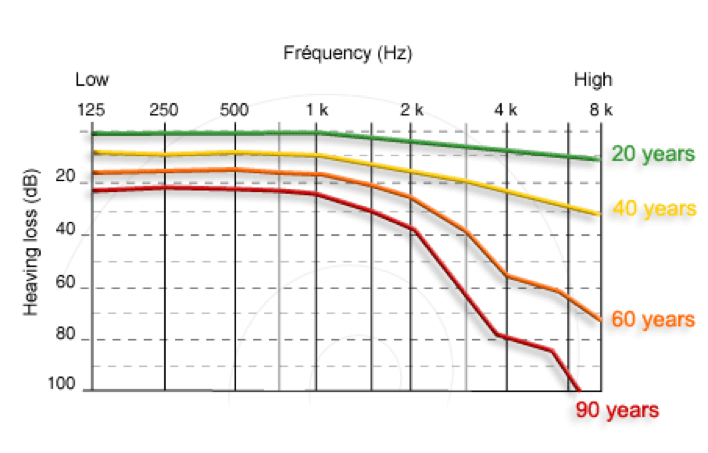Presbycusis (from Greek presbys “old” + akousis “hearing”), or age-related hearing loss, is the cumulative effect of aging on hearing. Age-related hearing loss is the gradual loss of hearing in both ears and statistically one in three adults over age 65 has hearing loss. Because of the gradual change in hearing, some people are not aware of the change at first. Most often, it affects the ability to hear high-pitched noises such as a phone ringing or beeping of a microwave. The ability to hear low-pitched noises is usually not affected

Speech information goes missing
With high frequency hearing loss we start to miss the high frequency sibilant unvoiced consonants like the “s”, “sh”, “f”, “thh” etc. People complain that they have sufficient volume but lack clarity. It’s like a crossword where we get partial information and piece in the missing information with other cues like lip reading and contextual information. Even when we think we are keeping up, we are unaware of what we hear incorrectly and we are working so much harder.
Greater Cognitive Load
This extra cognitive load has been shown to be very tiring and interfere with other critical processes such as short term memory. Unfortunately just turning the volume up generally offers little help as it tends to increase the volume of the low frequency sounds before it gives audibility to the lost high frequency sounds. The over loud low frequencies then blanket over the high frequencies in a process known as upward spread of masking. Hearing aids are set to a prescription that focuses on the high frequencies without increasing the low frequencies.
People with presbycusis often find it increasingly difficult to understand what others are saying, particularly when there is background noise or in groups, such as at a party, in restaurants, cafes and shopping centres because of the masking effect of the low frequencies over the soft unvoiced high frequency sibilant sounds.
Many factors can contribute to hearing loss as you get older. It can be difficult to distinguish age-related hearing loss from hearing loss that can occur for other reasons, such as long-term exposure to noise.
Similarities to Noise Induced Hearing Loss
Noise-induced hearing loss is caused by long-term exposure to sounds that are either too loud or last too long. This kind of noise exposure can damage the sensory hair cells in your ear that allow you to hear. Once these hair cells are damaged, they do not grow back and your ability to hear is diminished.

Conditions that are more common in older people, such as high blood pressure or diabetes, can contribute to hearing loss. Medications that are toxic to the sensory cells in your ears (for example, some chemotherapy drugs) can also cause hearing loss.
Rarely, age-related hearing loss can be caused by abnormalities of the outer ear or middle ear. Such abnormalities may include reduced function of the tympanic membrane (the eardrum) or reduced function of the three tiny bones in the middle ear that carry sound waves from the tympanic membrane to the inner ear.
Hearing loss due to aging can lead to tinnitus and research has also established a link between hearing loss and cognitive decline.
Treatment and rehabilitation of presbycusis primarily revolves around amplification. The use of a hearing aid and/or other assistive listening devices is recommended as treatment for age-associated hearing loss. (Medicinal treatment leading to complete restoration of hearing capacity is currently unavailable.) The long-term consequences of untreated age-associated hearing loss could include increased social isolation or depression. The use of a hearing aid system can, however, help diminish the debilitating symptoms and return some quality of life back to the afflicted person.
An audiologist can test your hearing and determine the nature of the hearing loss, investigate possible medical options, assess your communication difficulties and abilities and help put together a rehabilitation program for you. This may include discussing the most appropriate amplification options, counselling regarding tactics and strategies, tinnitus management, auditory rehabilitation and other techniques for enhancing communication.
Research clearly indicates that rehabilitation outcomes tend to be more positive when hearing problems are addressed earlier rather than later.
